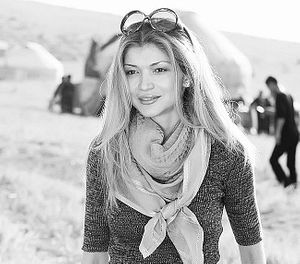More than three years after Gulnara Karimova, the eldest daughter of then-President Islam Karimov, disappeared into apparent house arrest, the Uzbek Prosecutor-General’s office has announced that she is in custody and facing additional charges.
According to RFE/RL, this is the first time Uzbek authorities have directly commented on Karimova’s status.
In late 2013, after a rampage of angry tweets lashing out at her family, Gulnara’s well-used account was deleted. By the following spring, she was reportedly under house arrest and photographs emerged of her — once an extravagant fashionista — looking disheveled.
Gulnara’s downfall paralleled the emergence of evidence laying bare her hand in massive corruption scandals. The pay-to-play telecom schemes, with Gulnara and her associates at the center, sprouted investigations in several European countries; but the Uzbek authorities also list more domestic crimes like tax evasion.
According to the Uzbek Prosecutor-General, Gulnara was convicted in August 2015 and sentenced to five years “restricted freedom” for corruption charges dating from 2001 to 2013. The statement issued today also stated that investigations continue into additional crimes — from kickbacks and fraud to customs violations and forgery — and outlined cash and property stashed across 12 different countries. The Uzbek authorities put the price tag of Gulnara’s corruption at $1.6 billion, €26 million, and 1.27 trillion Uzbek som ($311 million).
In the statement, the authorities listed $1.5 billion in assets owned by Karimova or her associates in Britain, France, Germany, Hong Kong, Ireland, Latvia, Malta, Russia, Spain, Switzerland, Sweden, and the United Arab Emirates, which Tashkent is seeking to impound. The assets allegedly include millions in cash, a villa in Switzerland, a chateau in France, penthouses in Moscow and Hong Kong, several other apartments and homes, a plane in Malta, and a stash of gold in the United Arab Emirates.
While Gulnara — known previously for her lavish jet-setting, globalized lifestyle, and dabbles in pop music and high fashion — was little-loved by critics of the Karimov government, the rapidity of her disappearance was shocking. Few, if any, outside observers have pushed back on the allegations lobbied at her, but groups like Human Rights Watch and others have stressed the necessity of due process and rule of law, in even Gulnara’s case.
Inasmuch as it is impossible to rewrite the past, there are two questions to be asked: why now and what next?
As EurasiaNet suggests, one reading of the situation concludes that the timing indicates that “Tashkent remains as uninterested as ever in transparency.”
Instead, it is more likely that Uzbekistan is launching another bid to be seen to be taking concrete action against Karimova as a way to persuade the United States to reverse a 2015 request to several European nation to freeze around $1 billion paid to businesses linked to Karimova by international telecommunications company seeking to guarantee operating rights in Uzbekistan. That amount has been reported by the Wall Street Journal to include 800 million Swiss francs ($793 million) seized in Switzerland — an amount also indicated the Uzbek prosecutors’ statement.
This very well may be the answer to the specific “why now” question, but a reasonable retort is “why not now?” If this kind of announcement — admitting a person is in custody and being explicit about the crimes with which they are being charged — is viewed as a stone on the path to reclaiming the frozen funds, may still be progress if it informs greater reform and opening. On the other hand, if the only time this happens is when millions are on ice, it’s not genuine progress.
More important, therefore, is the answer to the “what next” question.
Steve Swerdlow, a Human Rights Watch Central Asia researcher and on the docket to lead the group’s first delegation since 2011 to Uzbekistan next month, tweeted a few good questions as the news broke relating to whether Gulnara’s rights to counsel and fair treatment have been or will be respected; how willing is Tashkent to cooperate with U.S. and European authorities in gaining access to Gulnara for her testimony; what’s become of Gulnara’s associates, also sentenced in 2015; what’s the status of Gulnara’s children; and, perhaps most importantly, is this where corruption investigations stop or will others involved, in various government positions, be next?
These are not necessarily easy or comfortable questions to answer. They do, however, begin to scratch at the core of what nags many regional observers: is Uzbekistan’s apparent change in perspective and attitude, ushered in under new leadership last year, real change or just PR? Only time will tell.
































